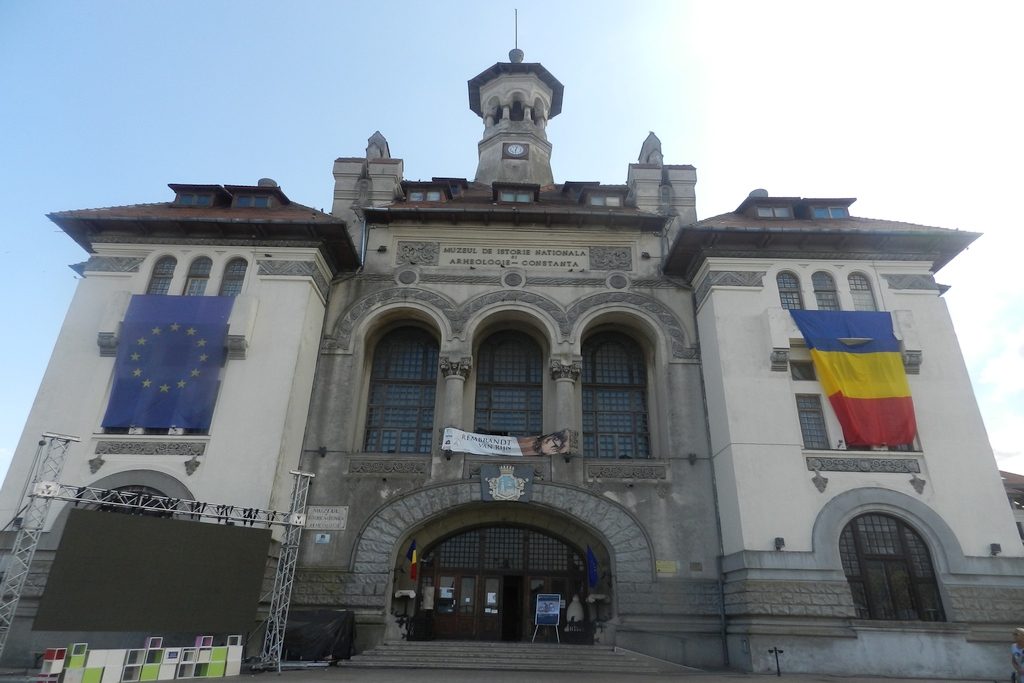

The first concerns for the establishment of a museum in Constanţa date from the first half of the last century, but only after the conquest of independence, the ancient artifacts got the attention of the Romanian Academy and of the mayors. Remus Opreanu, first Romanian prefect from Dobrudja, and the school inspector Ion Bănescu gather the artifacts from Constanţa and surroundings and house them in the Prefecture’s building. The small museum was disrupted during 1882 due to a fire. The saved monuments were housed in the public garden. After several wanderings, the Museum of National History and Archaeology was reorganized in this complete form during 1977. The museum building was built in the early twentieth century, with a Romanian specific architecture for the local government. It was transferred to the museum by Constanţa City Hall during 1977. Exhibits pieces of prehistoric, Greek, Roman, Byzantine and medieval archaeology: flint tools, pottery, tools and weapons, architectural elements, sculptural art, glass pots, bronze microstatues, jewels; numismatics: coins of bronze, silver and gold, unique being the Scythian coins; history. In two rooms located on the ground floor of the museum there are combined the archaeological monuments with great value, rare and unique pieces: the collection of statues “Tanagra type” (from the Hellenistic and early Roman age); anthropomorphic pottery or Dionysian representations; the Tomitan heritage of sculptures discovered in 1962 (bust of goddess Isis, aedicule with dual representation of the goddess Nemesis, the statuary group Fortuna with Pontos, the statue of Glycon Serpent etc.); the collection of imperial portraits (Antonius Pius, Caracalla, Gordian III, Philip the Arab, Constantine); collections of gold jewelery, gems and cameos; heritage of silver vessels discovered at Sucidava-Izvoarele. The first floor of the museum is arranged chronologically – from paleolitic to the Middle Ages: the large mammoth tusks from Poarta Albã, Hamangia ceramics; Mycenaean sword from Medgidia (XIV century BC) and deposits of sickles, axes and bronze ornaments discovered at N. Bălcescu, Constanţa, Gura Dobrogei; the limestone statue of a Thracian-Scythian prince (Sibioara) and a bronze cult boiler (Castelu), both of V Century V BC .; the collection of Greek amphorae and marble architectural fragments from public buildings of the Hellenistic Age, discovered at Tomis, Histria, Callatis; epigraphic monuments of Albeşti fortress. The Roman period is extensively represented by the discovered materials: epigraphic documents, stamped bricks, military pillars, architectural elements, farm tools, various ceramics, among which are outlined the collection of lamps, secular, votive and funeral sculpture – busts of some citizens, a solar dial, representations of the gods Venus, Apollo, Hercules, Cybele, the Thracian Knight, funerary portraits and stars. The last two halls of the floor illustrates the completion of the Romanian people: Romanian house from Xth century from Capidava reconstituted, religious objects and the monastic house from Basarabi. From the Byzantine period originate: the collection of skiff coins found in Isaccea, ceramics, tools and ornaments found in Gârliţa, Capul Viilor (Histria), Castelu, Dinogeţia etc. For the XVII – XVIII centuries, there are exposed weapons, religious objects and books, jewelry, household items and glazed pottery. The third floor illustrates the era between the period of disintegration of the feudal society until 1940: three-dimensional objects, documents and original photographs, books, maps, layouts.
